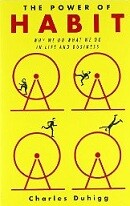“The Power of Habit: Why We Do What We Do in Life and Business”
By: Charles Duhigg
Rich Dowling, MA, LPC, MAC – SMART RECOVERY Volunteer Advisor
 ”Habits can be changed if we understand how they work”. So says Charles Duhigg, author of The Power of Habit: Why We Do What We Do in Life and Business.
”Habits can be changed if we understand how they work”. So says Charles Duhigg, author of The Power of Habit: Why We Do What We Do in Life and Business.
Even though I have considerable personal and professional experience addressing habits, I realized how much I did not know about habits after reading “The Power of Habit”.
The Habit Loop
In this circular model of habit development, first an individual is attracted to a particular idea (Cue), acts on it (Routine), and experiences a benefit (Reward). The process is then repeated: he responds again to the (Cue), repeats the behavior (Routine), experiences a benefit (Reward). The individual continues to repeat the cycle until he/she begins to crave the reward and a habit is born.
Scientific research with rats, monkeys and human beings supports, in rather dramatic and compelling ways, “The Habit Loop” and its effectiveness in creating and changing habits. The good news is, as the author states: “Habits aren’t destiny; they can be ignored, changed or replaced”.
The Golden Rule of Habit Change
The key to transforming negative habit to positive habit uses the same “Cue”, providing the same “Reward” , while changing the “Routine”. Mr. Duhigg offers the example of an “addict” seeking relief from emotional distress (the Cue) exchanging his/her consumption of alcohol ( the Routine) for attending AA meetings, therapy or other “alternate” routines.”
To individuals familiar with SMART Recovery, some of what the author offers may sound like he is “preaching to the choir” as the saying goes, but as one continues to read “The Power of Habit” it becomes clear the author offers additional information that can be useful in understanding habits in general.
The author goes on to take the exploration of habits to new levels as he explores “The Habits of Successful Organizations” and “The Habits of Societies” .
The Neurology of Free Will
The reader will learn that humans do indeed have a choice when it comes to developing habits and gaining independence from habits — and how corporations are able to leverage the science of habit to predict an individual’s needs by tracking their shopping habits. If you’ve ever received an e-mail advertising a specific product that meets a current need of yours and you thought it was a coincidence, think again. “They’ve got your number”, so to speak.
In conclusion, I offer one final quote from Mr. Duhigg: “Transforming a habit isn’t necessarily easy or quick. It isn’t always simple but it is possible. And now we understand how.” I have to agree: I now have a better understanding of “HABITS.” And if you choose to read The Power of Habit: Why We Do What We Do In Life And Business there is a good chance you will too!
Rich Dowling, MA, LPC, MAC is a SMART RECOVERY Volunteer Advisor and Founder-Owner of The Thought Exchange: Center for Personal Achievement in New Jersey.
